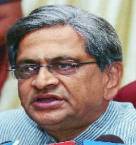India-Pak intelligence sharing is a very legitimate and will continue: Krishna
 New Delhi, Oct. 2 : External Affairs Minister S. M. Krishna has said that intelligence sharing between India and Pakistan is a very legitimate activity and added that it will be maintained notwithstanding adverse or negative reports appearing in the media on the issue.
New Delhi, Oct. 2 : External Affairs Minister S. M. Krishna has said that intelligence sharing between India and Pakistan is a very legitimate activity and added that it will be maintained notwithstanding adverse or negative reports appearing in the media on the issue.
Replying to a question on the sharing of intelligence and information about terrorism or terror-related activity emanating from the soils of the two countries as indicated in the joint statement issued after the meeting between the Indian Prime Minister, Dr. Manmohan Singh, and his Pakistani counterpart, Yousuf Raza Gilani in Sharm-el-Sheikh, Egypt, Krishna said: “I think, it is intelligence sharing between the two governments. So, I think, that’s a very legitimate activity.”
When asked whether this `legitimate intelligence sharing’ between the two nations would continue despite a New York Times report warning last month that the Lashkar-e-Toiba is still “largely intact’’ and is focused on carrying out terror strikes in India, the External Affairs Minister told ANI TV in an exclusive interview: “We will continue to do that (intelligence sharing), regardless of what the New York Times has reported.”
Probed further on media reports that suggested that the Lashkar-e-Toiba infrastructure is very much intact and that Pakistan’s Inter-Services Intelligence (ISI) had not given up backing suspected terror outfits allegedly operating from its soil, and on what was the message that the Indian Government had conveyed to Pakistan, Krishna said: “We have conveyed to the Pakistan Foreign Minister (Shah Mehmood Qureshi) that the instrumentalities of terrorism as reflected by this Lashkar-e-Toiba and other terrorist organizations, have to be dismantled. That’s one of the pleas that India has made with the Foreign Minister of Pakistan.”
When asked to comment on Islamabad’s move to differentiate between non-state actors and state actors with reference to the terror threat to India from across the border, and whether he had taken up this issue with his Pakistani counterpart on the sidelines of the 64th UN General Assembly session, Krishna told ANI TV: “That question did not come up.”
When asked whether on the issue of terrorism, New Delhi is accepting that there is a difference between non-state actors and state actors, and would it respond accordingly, Krishna replied in the affirmative by saying: “We will respond if it comes up.”
It may be recalled that the New York Times had quoted intelligence officials and current and former members of the (Lashkar) terror group, as saying that the group behind the 26/11 assault on Mumbai “remains largely intact and determined to strike India again.’’
The NYT report also quoted an unnamed US intelligence official and Lashkar members as saying that the links between the ISI and the Lashkar e Taiba were still alive and that it tied in with Indian assertions that Pakistan has not abandoned terrorism as a state policy and has not taken any action towards dismantling the terror infrastructure targeted at India.
The report also quoted four unnamed “Lashkar members’’ as saying that only a ``thin distance’’ separated the Lashkar and the ISI and that former ISI and military officials bridged the gap.
The report also quoted an unnamed US law enforcement official as saying that no credible evidence has emerged of Pakistani government involvement in the Mumbai attacks.
But the Lashkar network, according to the report, has ``persisted, even flourished’’ since the Mumbai terror attacks.
The NYT report further pointed out that even though Islamabad has promised to take action against the group, the Lashkar-e-Toiba network has grown since the Mumbai terror attacks. (ANI)